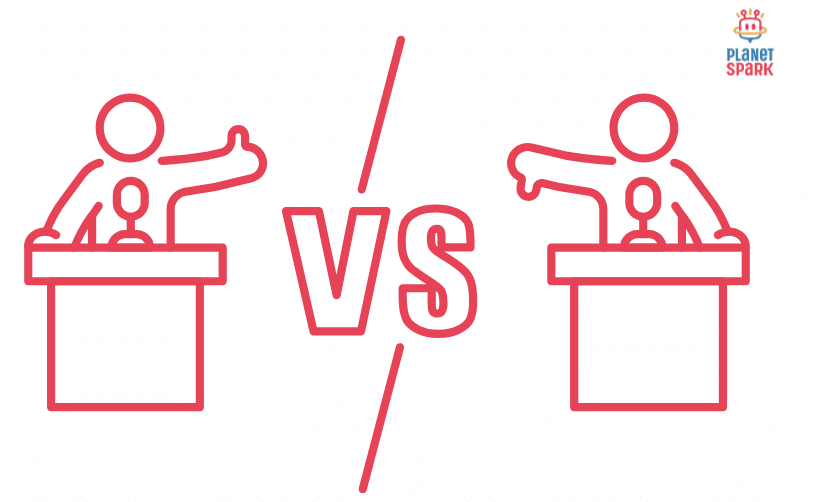100+ Best Debate Topics for Students | For School & Competition
Last Updated At: 1 Dec 2025
14 min read

Table of Contents
- 100+ Engaging Debate Topics for Students (Grouped by Age)
- How to Choose the Right Debate Topic for Your Child
- Tips to Help Students Prepare for a Debate
- Benefits of Debating for Students
- How to Start a Debate
- Rebuttal Techniques for Students
- Common Debate Challenges and How to Tackle Them
- Build Strong Debating Skills with PlanetSpark
- Conclusion
- FAQs
Debating is one of the most powerful ways for students to build confidence, think critically, and express their ideas clearly. Whether your child is in primary school or preparing for high school competitions, the right topic can help them explore perspectives, think logically, and grow as a learner.
At PlanetSpark, we support students in developing strong thinking and communication skills through engaging, age-appropriate learning experiences.
In this blog, we’ve compiled over 100 of the best debate topics for students, carefully grouped by age and interest. From fun and light-hearted questions to meaningful discussions, these topics are designed to spark curiosity and meaningful conversations, at home, in school, or during debate clubs.
100+ Engaging Debate Topics for Students (Grouped by Age)
Here’s a carefully curated list of the best debate topics for students, from fun choices for younger kids to thoughtful ideas for teens. Use these to spark classroom discussions, friendly debates at home, or prepare for school-level competitions.
Primary School Students (Ages 6–10)
Simple, fun, and easy to understand.
Should homework be banned?
Are cartoons better than books?
Should school uniforms be mandatory?
Is summer better than winter?
Should kids have mobile phones?
Is reading better than watching TV?
Should pets be allowed in school?
Should every school have a playground?
Are chocolates good for children?
Should birthday parties be celebrated in school?
Should kids choose their own clothes?
Are superheroes better than real-life heroes?
Should school days be shorter?
Are online classes better than in-person classes?
Should children get pocket money?
Should toys be allowed in classrooms?
Are fairy tales helpful for kids?
Should kids be allowed to cook?
Should exams be optional for young kids?
Should kids be allowed to bring snacks to class?
Boost your child’s confidence with expert-led debate training.
Book a Free Demo Session Now!
Middle School Students (Ages 11–13)
A step into reasoning and deeper thought.
Are video games good for learning?
Should junk food be banned in schools?
Should exams be replaced by projects?
Is online learning the future of education?
Should every student learn coding?
Are grades more important than creativity?
Is it better to be a topper or a team player?
Should students bring laptops to school?
Should schools teach life skills like cooking?
Should AI be used in classrooms?
Should libraries be replaced with tablets?
Is city life better than village life?
Should students vote in school elections?
Should school hours be shorter?
Should students be allowed to skip subjects they dislike?
Should students clean their classrooms?
Should kids wear smartwatches in school?
Should students wear casual clothes to school?
Should students be allowed to use YouTube in class?
Should students decide their school timetables?
High School Students (Ages 14–18)
Critical thinking meets current issues.
Should 16-year-olds be allowed to vote?
Is climate change the biggest threat today?
Should AI replace teachers?
Is a gap year after school helpful?
Should school start later in the day?
Are influencers better role models than celebrities?
Should colleges scrap entrance exams?
Is technology making us less social?
Should uniforms be banned in high school?
Should phones be banned in schools?
Is freelancing better than traditional jobs?
Should the internet be censored?
Should entrepreneurship be taught in schools?
Is gender labeling outdated in education?
Is school stress harming creativity?
Should all schools adopt AI tools like ChatGPT?
Are school rankings harmful?
Should students study finance in school?
Should schools promote internships over exams?
Is self-study better than classroom learning?

Help your child stand out in class discussions and competitions.
Book a Free Demo Session with PlanetSpark Now!
Universal Topics (For Any Age Group)
Flexible topics adaptable for any level.
Should students grade their teachers?
Should plastic be banned completely?
Is competition good for learning?
Are exams the best way to test learning?
Are books better than movies?
Should public speaking be mandatory?
Should debate be taught in every grade?
Is school the best place to learn life skills?
Should there be a 4-day school week?
Should students be allowed to listen to music while studying?
Should students be allowed to use AI to help with homework?
Are online friendships as valuable as real-life ones?
Should students be given mental health days off school?
Should sports be a daily activity in school?
Should uniforms be gender-neutral?
Are eBooks better than physical books?
Is failure more important than success?
Should students be allowed to skip grades?
Is curiosity more important than intelligence?
Should schools offer meditation or yoga every morning?
🎁 Bonus Topics (Fun, Thoughtful, and Trending)
Should space travel be available to students?
Is money more important than happiness?
Should robots have rights?
Can kindness solve most problems?
Is homeschooling better than regular schooling?
Should schools teach emotional intelligence?
Should students vote on school policies?
Should schools ban all plastic products?
Should parents control screen time strictly?
Should students use smartphones for learning?
Is classroom learning outdated?
Should outdoor classes be made mandatory?
Is AI a threat to human creativity?
Should students build personal brands online?
Is success more about talent or hard work?
Should all schools go paperless?
Should we celebrate failures like we celebrate success?
Is imagination more valuable than knowledge?
Should students get paid for doing well in school?
Should celebrities influence school curriculum content?
How to Choose the Right Debate Topic for Your Child
Choosing the right topic from the vast pool of debate topics for students is key to making debating fun and meaningful for your child. A good topic keeps them engaged, helps them think critically, and encourages respectful discussion.
Here’s how to choose a topic that fits:
✔️ Match the topic to your child’s age. Younger students need light, relatable ideas, while older children can explore current events, technology, or ethics.
✔️ Pick something they care about. When students feel personally connected to a topic, they express themselves better and stay motivated throughout the debate.
✔️ Choose balanced topics. A strong debate question should have two clear sides. This teaches kids to evaluate, reason, and communicate their opinions respectfully.
✔️ Think about the setting. For informal settings, creative or playful topics can work well. For formal debates, go with structured, research-based topics.
✔️ Support their non-verbal communication too. Good posture, eye contact, and facial expressions can strengthen a child’s argument. Click here for more on building positive body language during debates.
Tips to Help Students Prepare for a Debate
Preparing well for a debate builds not only subject knowledge but also communication and critical thinking skills. Here’s how students can get ready effectively:
Research both sides thoroughly. A strong debater understands both perspectives. Encourage your child to study arguments that support and oppose the topic. This helps them respond intelligently to counterpoints and strengthens their own stance.
Organise thoughts into a logical structure. Guide your child to break their argument into three parts, an engaging introduction, clear main points with examples, and a strong conclusion. This structure ensures their points are easy to follow and persuasive.
Practice speaking out loud regularly. Rehearsing out loud improves voice modulation, clarity, and pacing. It also helps children identify areas where they hesitate or rush and gives them a chance to correct those before the actual debate.
Build speaking confidence through small steps. Confidence is as important as content. Encourage your child to start with speaking in front of family members, record themselves, or present in front of a mirror. These exercises can greatly reduce anxiety. Click here for more on building confidence in public speaking.
Conduct mock debates at home. Simulate a real debate environment by assigning roles and having time limits. Practicing rebuttals in a safe space helps students think on their feet and sharpen their delivery under pressure.
These habits, when developed consistently, not only prepare kids for debates but also for real-life situations where clear thinking and confident speaking matter.

Sign up for a free trial and unlock your child’s potential in public speaking.
Benefits of Debating for Students
Debating helps students grow into confident, thoughtful communicators. It improves how they think, speak, and interact with others, both inside and outside the classroom.
1. Improves critical thinking
Debating teaches students to see both sides of a topic. For instance, if the topic is “Should homework be banned?”, they must explore different opinions, analyse facts, and respond with logic. This builds their ability to think clearly and make strong arguments.
2. Builds respectful communication
Students learn how to disagree without arguing. In a debate setting, they speak calmly, listen carefully, and challenge ideas politely. These skills help in daily conversations, group work, and future leadership roles.
3. Boosts self-confidence
When students speak in front of others, they slowly overcome hesitation. With practice, even shy learners become more confident. This confidence helps during class discussions, interviews, and public events.
4. Develops research habits
Good debaters back their points with facts. This means reading articles, gathering data, and checking sources. Over time, students become better at finding and using reliable information for all school subjects.
5. Encourages teamwork and planning
Most debates happen in teams. Students must divide tasks, support one another, and agree on a strategy. This builds cooperation and shows them how to lead or contribute to a group effort.
Debating isn’t just for future lawyers or politicians. It helps every student become sharper, bolder, and more prepared for real-life challenges.
How to Start a Debate
Starting a debate can feel challenging, but a strong opening sets the tone for the entire discussion. Whether you're speaking first or responding to the other side, your introduction should grab attention, introduce the topic clearly, and show confidence.
Begin with a clear stance
Start by stating your position on the topic. For example, if the motion is "Online learning is better than classroom learning," and you're on the 'for' side, you might say:
"We believe that online learning is a more effective and flexible way to educate students in today’s digital world."
Give a short context or hook
You can begin with a question, a surprising fact, or a real-life example. This makes your argument more relatable.
Example: "Did you know that over 70% of students in India now use online platforms for schoolwork? This shift shows just how powerful virtual learning has become."
Outline your main points
Briefly mention the arguments you’ll be covering. This helps the audience know what to expect and shows that you're well prepared.
Example: "Today, we will show how online learning improves access, personalisation, and time management for students."
Stay calm and confident
Speak clearly, use short sentences, and make eye contact if you’re presenting in person. A confident tone helps build credibility.
Starting your debate with a strong, organised introduction gives you a great head start. It shows that you understand the topic and are ready to present your views effectively.
Rebuttal Techniques for Students
Learning how to deliver a strong rebuttal is one of the most essential skills in debating. Whether you're engaging with casual classroom discussions or formal competitions, mastering rebuttals can help students stand out. It’s also one of the best ways to sharpen thinking while exploring popular debate topics for students.
Understand the opposing point clearly
Before you respond, listen closely to what the other side is saying. A good rebuttal starts with understanding, not interruption. For example, if a team argues that “social media boosts student creativity,” make sure you grasp their main claim before countering with facts about distraction or screen-time effects.
Refute the argument with logic
Once you've understood the point, present a clear counterpoint. Instead of saying “That’s wrong,” show why it's incomplete or flawed. If the debate topic is “Should uniforms be mandatory in schools?” and the other team says they reduce peer pressure, you might respond with, “While uniforms can reduce some pressure, they don’t solve issues like bullying or academic stress, which are larger concerns.”
Use evidence to back your rebuttal
A rebuttal becomes more convincing when you include examples, research, or real-life situations. If someone says “homework improves learning,” a good rebuttal might reference studies showing students perform better when learning is balanced with rest and play.
Keep your tone respectful
Rebuttals aren’t meant to attack people, only ideas. Keeping a calm and respectful tone helps you sound confident, focused, and credible, even when you're strongly disagreeing.
Practice with different debate topics for students
The more topics you explore, the more confident you'll become in identifying weak arguments and responding effectively. Practising rebuttals across the best debate topics for students like technology in education, climate change responsibility, or online learning makes you ready for any discussion.
Common Debate Challenges and How to Tackle Them
This table highlights quick tips to help students overcome common hurdles while preparing for popular debate topics for students.
| Challenge | Tip to Overcome |
|---|---|
| Struggling to stay on topic | Choose age-appropriate debate topics for students to stay focused |
| Lack of confidence | Practice regularly in front of a small group |
| Forgetting key points | Use cue cards or create a clear outline |
| Weak rebuttals | Practice with common debate topics for students to strengthen arguments |
| Speaking too fast or too softly | Record yourself to work on pace and clarity |
| Getting nervous during Q&A | Prepare responses to opposing views in advance |

Build Strong Debating Skills with PlanetSpark
Every great debater starts with the right guidance. At PlanetSpark, we help students go beyond textbook arguments and develop the confidence to think critically, speak clearly, and respond thoughtfully. Whether your child is exploring beginner-friendly debate topics or tackling complex issues, our programs are tailored to their age and skill level.
Our expert-designed curriculum builds core communication and reasoning skills through fun, interactive sessions led by trained professionals.
Why Parents Trust PlanetSpark for Debate Training:
Interactive Live Classes: Kids learn in real-time with passionate teachers who make debate fun and engaging.
Age-Appropriate Modules: Lessons are designed for every stage, whether your child is 6 or 16.
Focus on Thinking + Speaking: Students learn how to construct arguments, use logic, and listen actively.
Confidence That Lasts: Regular practice, feedback, and real-life scenarios help kids apply their skills beyond the classroom.
Whether you're preparing your child for school-level competitions or simply want them to speak up with clarity, PlanetSpark gives them the tools to thrive in every discussion.
Conclusion
Choosing the right debate topics for students can be the first step toward helping them grow into confident, thoughtful communicators. When students engage in meaningful debates, they don’t just learn to win arguments, they learn to listen, reason, and speak with purpose.
Whether your child is preparing for a school debate or simply looking to strengthen their critical thinking skills, guiding them through the right topics and techniques makes all the difference. And with expert-led support from platforms like PlanetSpark, this journey becomes even more impactful.
Encourage your child to speak up, explore new ideas, and take part in discussions that matter. The right debate topic could spark a lifelong love for learning and leadership.
FAQs
1. What are good debate topics for students?
Good debate topics for students are age-appropriate, thought-provoking, and relevant. Examples include "Should students wear uniforms?" and "Is online learning better than classroom learning?"
2. How do I help my child choose the right debate topic?
Pick a topic that interests your child and matches their understanding. Make sure it is neither too easy nor too complex. This helps them stay engaged and confident while debating.
3. Can debating help improve my child’s communication skills?
Yes. Debating teaches kids how to speak clearly, think critically, and listen actively. It improves their vocabulary, confidence, and ability to express ideas.
4. At what age can children start debating?
Children as young as 7–8 years can begin with simple debates. They can start with fun topics and gradually move to structured arguments as they grow.
5. Where can I find support to improve my child’s debating skills?
You can enroll your child in expert-led programs like PlanetSpark. Click here to explore live public speaking and debating courses tailored for kids.
Download Free Worksheets
Personalized Communication Report
Record a video to get a AI generated personalized communication report for your child
Select Learner's Class

Hi There, want to try these
tips for your child with
LIVE with our expert coach?
Let's check your child's
English fluency




